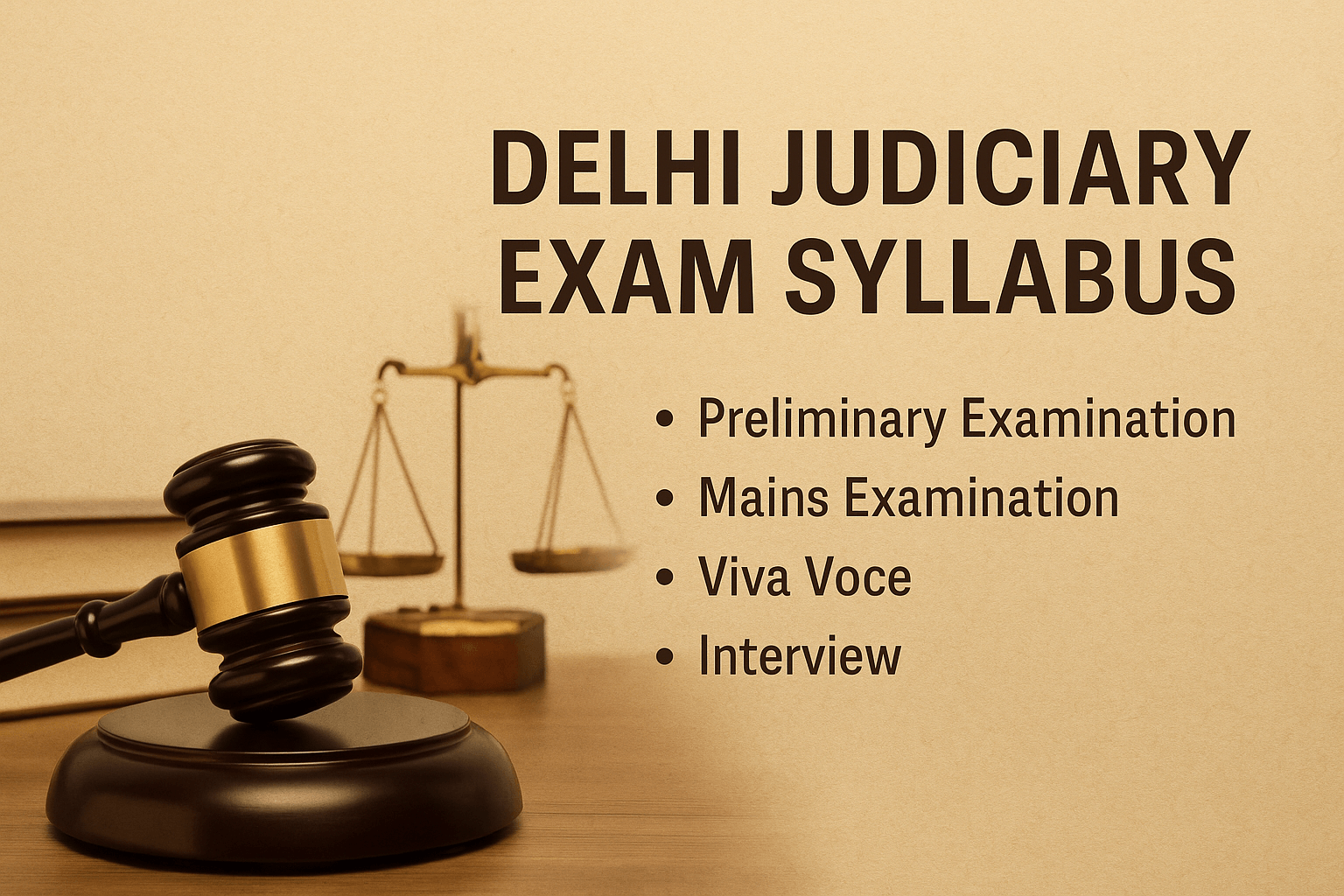Delhi Judiciary Exam Syllabus: A Comprehensive Guide for Aspiring Civil Judges
The Delhi Judiciary Exam is one of the most prestigious and competitive judicial services examinations in India. Conducted by the Delhi High Court, this exam is the gateway for aspiring legal professionals to enter the Delhi Judicial Services as Civil Judges. With thousands of aspirants eyeing a limited number of vacancies each year, understanding the detailed syllabus becomes the first and most important step in preparing strategically.
In this blog, we will take a deep dive into the Delhi Judiciary Exam syllabus, breaking it down stage by stage — Preliminary, Mains, and the Viva Voce (Interview). We’ll also provide insights on how to approach each section effectively, what topics require special attention, and tips to maximize your score.
Join WhatsApp community for Free Notifications, Updates, Study Material, Mock Tests, Internship Updates, and Current Affairs - CLICK HERE TO JOIN
Understanding the Delhi Judiciary Exam Structure
Before diving into the syllabus, it’s important to understand the structure of the exam. The Delhi Judicial Services Examination is conducted in three stages:
- Preliminary Examination (Objective Type)
- Mains Examination (Written / Descriptive)
- Viva Voce (Interview)
Each stage is qualifying in nature, meaning you must pass one to proceed to the next. Let’s explore the syllabus for each stage in detail.
Stage 1: Delhi Judiciary Preliminary Examination Syllabus
The Preliminary Examination serves as a screening test. It is objective in nature, consisting of multiple-choice questions (MCQs). The primary goal of this stage is to shortlist candidates for the Mains examination. Marks obtained in this stage are not counted for the final merit list.
Subjects Covered in Preliminary Exam:
- General Legal Knowledge
- Acts and Laws (Substantive and Procedural)
- Current Legal Developments
- English Language and General Aptitude
Let’s elaborate on these areas:
General Legal Knowledge
This section assesses the candidate’s awareness of fundamental legal principles and recent developments in Indian laws. Topics include important case laws, landmark judgments, constitutional developments, and legal maxims.
Substantive and Procedural Laws
This is the most crucial part of the preliminary syllabus. It includes:
- The Constitution of India
- The Code of Civil Procedure, 1908
- The Code of Criminal Procedure, 1973
- The Indian Penal Code, 1860
- The Indian Contract Act, 1872
- The Indian Evidence Act, 1872
- The Limitation Act, 1963
- The Specific Relief Act, 1963
- The Delhi Rent Control Act, 1958
- The Indian Partnership Act, 1932
- The Arbitration and Conciliation Act, 1996
- The Sale of Goods Act, 1930
- The Negotiable Instruments Act, 1881
To Enroll in Knowledge Nation Law Centre - Click Here
English and General Aptitude
This portion may include comprehension, vocabulary, sentence correction, and basic reasoning skills. Although less weightage is given, this can be a scoring section if prepared well.
Tips for Preliminary Exam:
- Focus on bare acts; understand the structure and keywords.
- Regularly read current legal news, especially Supreme Court and Delhi High Court judgments.
- Practice mock tests and previous year’s question papers to improve speed and accuracy.
- Highlight important sections and memorize procedural timelines.
Stage 2: Delhi Judiciary Mains Examination Syllabus
The Mains Examination is the heart of the Delhi Judiciary selection process. It consists of four descriptive papers. This stage is designed to test a candidate's legal acumen, reasoning, drafting ability, and language skills in depth.
The four papers in the Mains exam are:
- General Knowledge and Language
- Civil Law – I
- Civil Law – II
- Criminal Law
Let’s examine each of these papers in detail:
1. General Knowledge and Language
This paper is divided into two parts:
Part A – General Knowledge
This section tests the candidate's awareness of current affairs, history, geography, economics, and general studies. While it may not directly involve legal topics, it plays a key role in forming a well-rounded judicial officer.
Part B – Language (English Essay, Translation)
Candidates are required to write an essay in English on a legal or general topic. Additionally, translation exercises are included:
- Translating a passage from English to Hindi (using Devanagari Script)
- Translating a passage from Hindi to English
This part tests not just language proficiency but also clarity of thought and articulation.
2. Civil Law – I
This paper includes the following topics:
- The Indian Contract Act, 1872
- The Sale of Goods Act, 1930
- The Partnership Act, 1932
- The Specific Relief Act, 1963
- The Indian Transfer of Property Act, 1882
- The Hindu Law and Mohammedan Law
- The Delhi Rent Control Act, 1958
- Law of Torts
Each of these laws requires in-depth understanding. You must be able to write detailed answers, cite relevant sections, case laws, and explain principles with clarity.
To Enroll in Knowledge Nation Law Centre - Click Here
3. Civil Law – II
The second civil law paper includes procedural laws and evidence:
- The Code of Civil Procedure, 1908
- The Indian Evidence Act, 1872
- The Limitation Act, 1963
- Law related to pleadings and drafting
This paper tests the candidate's ability to apply the law to factual situations and draft appropriate legal documents like plaints, written statements, and interlocutory applications.
4. Criminal Law
This paper includes:
- The Indian Penal Code, 1860
- The Code of Criminal Procedure, 1973
- The Indian Evidence Act, 1872
Candidates must demonstrate clear understanding of substantive and procedural aspects of criminal law. Framing charges, analyzing witness testimony, and applying legal principles to practical scenarios are part of this paper.
Tips for Mains Exam:
- Focus on writing practice. Speed and presentation are key to scoring high.
- Use relevant case laws to strengthen your answers.
- Don't just memorize; understand the "why" behind legal principles.
- Practice essay writing on current legal and social topics.
- Study model answers and past toppers' copies, if available.
Join WhatsApp community for Free Notifications, Updates, Study Material, Mock Tests, Internship Updates, and Current Affairs - CLICK HERE TO JOIN
Stage 3: Viva Voce / Interview
The final stage is the Viva Voce, where candidates who qualify the Mains are called for a personal interview. The purpose of the interview is to assess the candidate’s overall personality, temperament, communication skills, and suitability for a judicial post.
Interviewers look for:
- Presence of mind
- Integrity and honesty
- Legal acumen
- Knowledge of current legal affairs
- Awareness of current socio-political developments
- Clarity of expression
Though it carries fewer marks compared to Mains, it can be a deciding factor. A candidate who performs exceptionally well in the interview can improve their overall ranking significantly.
Tips for Viva Voce:
- Be confident, not arrogant.
- Keep updated with recent Supreme Court and Delhi High Court judgments.
- Practice mock interviews with mentors or peers.
- Be honest in responses; don't try to bluff your way through.
To Enroll in Knowledge Nation Law Centre - Click Here
How to Prepare for the Delhi Judiciary Exam Syllabus
Preparing for the Delhi Judiciary Exam is a marathon, not a sprint. The syllabus is vast, and the competition is intense. Here are some final strategies to keep in mind:
1. Master the Bare Acts:
Read and reread the bare acts. Know the sections, illustrations, and definitions thoroughly. They are the foundation of your preparation.
2. Create Your Notes:
Summarize important sections, exceptions, and judgments in your own words. These notes will help in revision, especially closer to the exam.
3. Practice Answer Writing:
Descriptive writing is an art. Practice writing answers under timed conditions. Use IRAC (Issue, Rule, Application, Conclusion) structure wherever possible.
4. Stay Consistent:
Avoid long breaks in study. Even one hour a day of revision can help maintain continuity and retention.
5. Take Mock Tests:
Simulate exam conditions at home or join a test series. It helps with time management and identifying weak areas.
6. Read Landmark Judgments:
Familiarize yourself with key constitutional and civil/criminal law judgments. Knowing case names and their ratios can set your answers apart.
Join WhatsApp community for Free Notifications, Updates, Study Material, Mock Tests, Internship Updates, and Current Affairs - CLICK HERE TO JOIN
Final Words
The Delhi Judiciary Exam demands deep commitment, patience, and rigorous preparation. The syllabus may seem overwhelming at first, but with structured preparation and consistent efforts, it becomes manageable. Remember, the goal is not just to crack the exam but to become a competent and fair judicial officer who upholds justice and the Constitution.
Stay focused, stay disciplined, and stay motivated. The black robe awaits.

 Info@Knowledgenation.co.in
Info@Knowledgenation.co.in











Leave a Comment